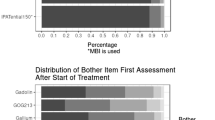Abstract
The purpose of this investigation is to examine methods of scoring the FACT-G when there is nonresponse to individual questions. Using completed questionnaires from 350 patients, random and nonrandom missing responses where simulated. Seven methods of scoring the FACT-G are compared on the basis of accuracy (bias and precision) of both population estimates and prediction of individual scores. Substituting the mean of the completed items in the subscale when more than 50% are completed is generally the most unbiased and precise approach. Case deletion is the worst approach and results in clinically significant bias when the missing responses were non-random and a lack of precision when the rate of non-response was high.
Similar content being viewed by others
References
Korn EL, O'Fallon J. Statistical Considerations, Statistics Working Group. Quality of Life Assessment in Cancer Clinical Trials. Report on the Workshop on Quality of Life Research in Cancer Clinical Trials, Division of Cancer Prevention and Control. National Cancer Institute, 1990.
Fairclough DL, Gelber RD. Quality of Life: Statistical Issues and Analysis. Quality of Life and Pharmacoeconomics in Clinical Trials, Second Edition. Spilker B, ed. New York: Raven Press Ltd, 1995.
Hopwood P, Stephens RJ, Machin D. Approaches to the analysis of quality of life data: experiences gained from a Medical Research Council Lung Cancer Working Party palliative chemotherapy trial. Qual Life Res 1994; 3: 339–352.
Dempster AP, Laird NM, Rubin DB. Maximum likelihood from incomplete data via the EM algorithm (with Discussion). J R Stat Soc B 1972; 39: 1–38.
Jennrich R, Schluchter M. Unbalanced repeated-measures models with structured covariance matrices. Biometrics 1986; 42: 805–820.
Schluchter MD. Methods for the analysis of informatively censored Longitudinal data. Statistics in Medicine 1992; 11: 1861–1870.
DeGruttola V, Tu XM. Modeling progression of CD4-Lymphocyte counts and its relationship to survival time. Biometrics 1994; 50: 1003–1014.
Little RJ, Rubin DB. Statistical Analysis with Missing Data. New York: John Wiley & Sons, 1987.
Morris J, Coyle D. Quality of life questionnaires in cancer clinical trials: Imputing missing values. Psycho-Oncology 1994; 3: 215–222.
Cella DF, Tulsky DS, Gray G, et al. The functional assessment of cancer therapy scale: Development and validation of the general measure. J Clin Oncol 1993; 11: 570–579.
Stewart AL, Hays RD, Ware JG. The MOS Short-form General Health Survey. Med Care 1989; 26: 724–735.
Schipper H, Clinch J, McMurray A, Levit M. Measuring the quality of life of cancer patients: the Functional Living Index—Cancer: Development and validation. J Clin Oncol 1984; 2: 472–483.
Cella DF. FACT: Manual Functional Assessment of Cancer Therapy (FACT) Scales and the Functional Assessment of HIV (FAHI) Scale. Version 3. Chicago, IL: Rush-Presbyterian-St Luke's Medical Center, 1994.
Ware J, Snow K, Kosinski M, Gandek B. SF-36 Health Survey: Manual and Interpretation Guide. Boston: Nimrod Press, 1993.
Buck SF. A method of estimation of missing values in multivariate data suitable for use with an electronic computer. J Roy Statist Soc B 1960; 22: 302–306.
Author information
Authors and Affiliations
Additional information
Supported by grants from the National Cancer Institute, DHHSCA-23318, CA-51926, and American Cancer Society #PBR6132.
Rights and permissions
About this article
Cite this article
Fairclough, D.L., Cella, D.F. Functional Assessment of Cancer Therapy (FACT-G): Non-response to individual questions. Qual Life Res 5, 321–329 (1996). https://doi.org/10.1007/BF00433916
Received:
Accepted:
Issue Date:
DOI: https://doi.org/10.1007/BF00433916




